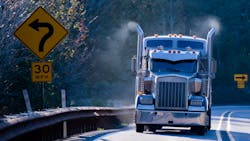Roeth: Trucking businesses, climate activists must work together
It’s funny how quickly things can change. I just got back from Climate Week NYC, a very intense week filled with many meetings, discussions, and conversations. Not to mention a monsoon on Monday, many subway rides, fast walks, and—well, you know—the sounds, sights, and smells of a big city.
For those of you not familiar with Climate Week NYC, it is considered the largest annual climate event of its kind. There are about 400 events and activities across New York City where “business leaders, political change makers, local decision makers, and civil society representatives of all ages and backgrounds, from all over the world, gather.” According to the event website, the goal of the week is “to drive the transition, speed up progress, and champion change that is already happening.”
I first attended Climate Week in 2015 with Richard Branson. It seemed to me back then that the people attending were all hard-line champions of the climate—which was a good thing—but they also did not seem to care as much about the concerns of businesses that would be required to invest in the changes to improve the environment while remaining profitable. Back then, sustainability was not a topic of discussion in business.
This year things felt very different to me. The discussions and conversations I had left me feeling like each side was trying to see things from the other side’s perspective. It felt like everyone has realized that tackling the climate challenge is going to take cooperation and collaboration from both climate experts and business and industry leaders. An us-versus-them mentality will not get the job done.
See also: Roeth: Working together for the environment and profit
In fact, the theme of this year’s event was “We Can. We Will.” Again, quoting from the event’s website: “The theme reflects determination, focus but also a hopeful promise, and a call to action to do it together. It touches upon the action we need to take now, but also the need to look ahead and explore new opportunities.”
Business and industry leaders are publicly announcing the sustainability goals they have set along with the deadline for achieving those goals. In addition, they are making real efforts to reduce their carbon footprint. Changes might not be happening as quickly as some would like, but climate experts are supporting business and industry as they work to achieve the goals they have set.
Working together usually leads to better results more quickly when dealing with complex issues.
It was good to see that the various climate stakeholders are working collaboratively for the benefit of all of us. Finally, I would like to thank RMI and the many other folks, including CERES, Calstart, Clean Freight Centre, EDF, TDA and others, that helped me navigate all the great discussions.
Michael Roeth has worked in the commercial vehicle industry for nearly 30 years, most recently as executive director of the North American Council for Freight Efficiency (NACFE). He serves on the second National Academy of Sciences Committee on Technologies and Approaches for Reducing the Fuel Consumption of Medium and Heavy-Duty Vehicles and has held various positions in engineering, quality, sales, and plant management with Navistar and Behr/Cummins.
About the Author

Michael Roeth
Executive Director
Michael Roeth is the executive director of the North American Council for Freight Efficiency. He serves on the second National Academy of Sciences Committee on Technologies and Approaches for Reducing the Fuel Consumption of Medium and Heavy-Duty Vehicles and has held various positions with Navistar and Behr/Cummins.
